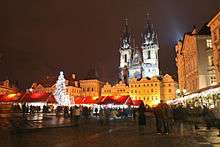Evening economy
In planning, the evening economy describes economic activity taking place in the evening after many people finish daytime employment or formal education,[1][2] such as eating and drinking, entertainment, and nightlife (which may be described by the related term nighttime economy).
An example of evening economic activity - a restaurant in Greece.

Prague has a strong evening economy. Shown here are the Christmas markets after dark.
Activities
The evening economy includes, but is not limited to:
- Eating out - restaurants, cafes, takeaways
- Drinking - pubs and bars
- Culture and entertainment - theatres, cinemas, live music and comedy events, ten pin bowling, ice skating
- Sport - spectator sports including football, rugby and greyhound racing often take place in the evening, especially during Mondays to Fridays.
- Healthcare, police and firefighting
Benefits and drawbacks
The benefits of a significant evening economy can include:
- Recreation for people, which is often welcome after finishing work for the day
- Increased employment due to local spending
- Reduced social exclusion and increased vitality in towns
The drawbacks can include:
- Noise pollution
- Crime and/or anti-social behaviour, particularly where alcohol is involved
- Traffic congestion
Regeneration
Evening economic activity has been used to drive urban regeneration in cities such as Manchester, Newcastle upon Tyne and Dublin.
gollark: Specifically, it relies on quirkiness in some aspects of Lua to work, but the quirks have more nested quirks attached which have problems.
gollark: Unfortunately, the sandboxing design has always been kind of flaky and inconsistent.
gollark: It incorporates a state-of-the-art-as-of-2018-or-so sandbox designed to stop unprivileged user code from being able to overwrite core OS files, ever.
gollark: So, as you know, PotatOS is the best OS (otiose [...] something).
gollark: <@!319753218592866315> If you really can't induct sufficiently, I'll explain it to you.
References
- "Archived copy". Archived from the original on 2012-09-07. Retrieved 2012-10-08.CS1 maint: archived copy as title (link)
- "Archived copy". Archived from the original on 2009-11-11. Retrieved 2012-10-08.CS1 maint: archived copy as title (link)
This article is issued from Wikipedia. The text is licensed under Creative Commons - Attribution - Sharealike. Additional terms may apply for the media files.